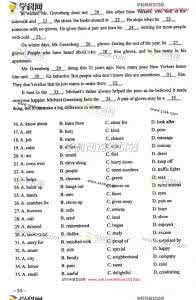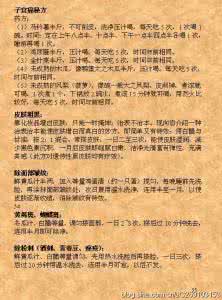2013届新课标高考英语精华知识点终极解密
专题13 倒装句
英语的基本语序是“主语+谓语”,如果将谓语的一部分或全部放在主语之前,这种语序叫倒装。倒装既是一种语法手段,也是一种修辞手段,用于表示一定的句子结构或强调某一句子成分。
一. 倒装的原因
A. 语法倒装
由于语法结构的需要,将谓语的全部或一部分移到主语之前。
1. 一般疑问句
当我们把一个肯定句转变为疑问句时,常把肯定句中的助动词或情态动词放在句首。这类助动词或情态动词包括:be, have, can, do, shall, will, may, must, dare, need, ought或 used 等。
He will do it.
——Will he do it 他会做这件事吗?
This is my mobile phone number.
——Is this your mobile phone number? 这是你的手机号码吗?
提示:
如果肯定句中没有助动词或情态动词时, 我们可以在句首用do 的某种形式,以构成倒装语序。
Jack likes to eat fish. 杰克喜欢吃鱼。
——Does Jack like to eat fish 杰克喜欢吃鱼吗?
2. 特殊疑问句
特殊疑问句的构成:特殊疑问词 + 一般疑问句
What does he like to eat 他喜欢吃什么?
When will they go to the Great Wall 他们什么时候去长城?
Where did you go last night 昨晚你去哪里了?
提示:如果疑问代词在句中做主语,句子不要倒装。
Who is not coming to dinner tonight 今晚谁不来吃饭?
3. 反意问句
在反意问句中,用一般疑问句的形式,前后两分句的主语,人称要一致。前一分句是肯定,反意问句用否定形式,并一定要缩写;前一分句是否定, 反意问句用肯定形式。
Everything is ready, isn't it 一切都准备好了,是吗?
Bobbie seldom got drunk, did he 博比很少喝醉,是吗?
You had a wonderful time last night, didn't you 昨天晚上你玩得很愉快,是吗?
4.感叹句
英语中的感叹句有时也通过倒装的形式来表达。
Here comes Santa Clause! 圣诞老人来啦!(谓语前置)
What bad manners they have! 他们真没礼貌!(宾语前置)
How happy the children are!孩子们多么幸福啊!(表语前置)
5. 某些含有“really”意义的简短表达,也用倒装语序,但它们并不需要任何回答。
--- Elsa saw a snake last night. 埃尔莎昨天晚上看到一条蛇。
--- Did she 真的吗?
--- Our new boss is very easygoing. 我们的新老板人很随和。
--- Is he 是吗?
--- Philip has already finished his report. 菲利普已经完成了他的报告。
--- Has he 真的吗?
6.以引导词there引起的陈述句
There was nobody in the room. 房间里没有人。
In the valley there lies a river. 山谷里有一条河。
There is no harm in trying. 不妨一试。
7.虚拟条件句
①在虚拟语气中,如果不用if,且从句中有were, had, should等助动词,需将助动词were, had, should放在句首,用倒装语序。
If I were a bird, I could fly freely.
——Were I a bird, I could fly freely. 假如我是一只小鸟,我就能自由翱翔。
If I had known it earlier, I would have lent him the money.
——Had I known it earlier, I wouldn誸 have lent him the money. 要是我早知道这件事,我就不会把钱借给他了.
②表示祝愿的一些句子
Long live peace! 和平万岁!
May our friendship be ever lasting! 愿我们的友谊长存!
8.直接引语的一部分或全部放在句首时
You should have been here five minutes ago,said the teacher. 老师说:“你5分钟之前就该来了。”
Douglas,said the teacher, do be careful next time.“道格拉斯,”老师说道,“下次一定要小心。”
B. 修辞倒装
为了突出重要的内容,或为了生动地描写动作,人们往往采用修辞倒装。

1.为了强调
Never before have we seen such a sight. 以前我们从来没有见过这样的情景。
Only in this way can we learn English well. 只有用这种方法,我们才能学好英语。
Selfish does our life make us students. 是生活把我们的学生变得如此自私。
2.为了生动流畅
Up went the rocket into the sky. 嗖的一声火箭上了天。
Before us lay a lot of difficulties. 我们面前有很多困难。
Happy are those who are contented. 知足者常乐。
Next came a man in his forties. 接下去进来一个四十多岁的男人。
Long did we wait before hearing from her. 我们等了很久才收到她的信。
C. 一些句型的固定用法
Such were his last words. 他最后的话就是这样。
Hardly had I got home when the telephone rang. 我一到家,电话就响了。
How came it that she knew the secret 她怎么会知道那个秘密的?
二. 倒装的种类
英语最基本的词序是主语在谓语动词的前面。如果将句子的主语和谓语完全颠倒过来,这称之为完全倒装。如果只将助动词或情态动词移至主语之前,谓语的其他部分仍保留在主语的后面,这称之为部分倒装。
A. 完全倒装
完全倒装是将谓语的全部放在主语之前,此结构通常只用于一般现在时和一般过去时两种。
On her left sat her husband. 她左边坐着她丈夫。
Here is the book you want. 你要的书在这儿。
Down went the small boat. 小船沉下去了。
B. 部分倒装
部分倒装是指将谓语的一部分,如助动词或情态动词,移至主语之前。
Only by working hard can one succeed. 只有努力才能成功。
Never have I seen her before. 我以前没见过她。
提示:如果句中的谓语没有助动词或情态动词,则需添加助动词do, does或did,并将其置于主语之前。
Well do I remember the day I joined the League.入团的那一天,我记忆犹新。
Little did I think that he could be back alive 我没有想到他竟能活着回来。
三. 常见的倒装结构
A. 常见的完全倒装结构
1.there be 句型。
There is a mobile phone and some books on the desk. 桌上有一个手机和一些书。
There are thousands of people gathering on the square. 广场上聚集着成千上万的人
注意 引导词there 还可以接appear, exist, lie, remain, seem, stand, live 等词。
There lived an old fisherman in the village. 村里住着一位老渔夫。
There stand two white houses by the river. 河滨矗立着两座白房子。
There existed some doubt among the students. 学生中有些怀疑。
2.用于here, there, now, thus, then + 动词 + 主语的句型中(谓语动词多为be, go, come等)。
Here comes the bus.汽车来了。
There goes the bell. 铃响了。
Now comes my turn. 轮到我了。
Then came the order to take off. 起飞的命令到了。
3.以out, in, up, down, off, away等副词开头,谓语动词是表示“移动”的go, come, leave等句子里。
Away went the crowd one by one. 人们一个一个地离去。
In came a stranger in black. 进来了一位穿黑衣的陌生人。
Down fell the leaves. 树叶掉了下来。
注意在完全倒装的结构里,如果主语是人称代词,则用正常语序。
Out she went. 她走了。
Here we are. 我们到了。
4.表示地点的介词词组位于句首,谓语动词是表示“存在”之意的be, lie, stand, exist等句子中。
South of the lake lies a big supermarket. 湖泊的南边是一个大超市。
20 miles east of our school lies a modern swimming pool. 我们学校向东20英里有一个现代化的游泳池。
On the floor were piles of old books, magazines and newspapers. 地板上是一堆堆旧的书报杂志。
5. “表语+连系动词+主语”结构。
Lucky is she who was admitted to a famous university last year.
她很幸运,去年被一所名牌大学录取。
Gone are the days when he was looked down upon.
他被人看不起的日子一去不复返了。
Present at the meeting are some well-known scientists.
一些知名的科学家出席了会议。
B. 常见的部分倒装结构
1. 含有否定意义的副词或连词(如not, seldom, little, hardly, never, rarely, nowhere等)放在句首时。
He can not speak a single word of English.
——Not a single word of English can he speak. 他连一个英语单词都不会说。
He cares little about his clothes.
——Little does he care about his clothes. 他不在乎穿着。
I have never seen him before.
——Never have I seen him before.
——Never before have I seen him. 我以前没见过他。
The mother didn't leave the room until the child fell asleep.
——Not until the child fell asleep did the mother leave the room. 孩子睡着了,妈妈才离开房间。(Not until引出的主从复合句中,主句倒装,从句不倒装。)
Churchill was not only a statesman, but a poet
——Not only was Churchill a statesman, but a poet. 丘吉尔不仅是个政治家,而且还是个诗人。
I shall by no means give up.
——By no means shall I give up. 我决不放弃。
必背:表示“刚……就……的倒装结构
Hardly had he started to leave when it began to rain. 他刚要离开,天就下起了雨。
Scarcely had he sat down when his mobile phone rang. 他刚坐下,手机就响了。
No sooner had he handed in his paper than he realized his mistakes. 他刚交卷就意识到出错了。
2. 副词only +状语放在句首时。
Only then did I see life was not easy. 只有那时我才知道生活是不易的。
Only in this way can you use the computer well. 只有用这种方法你才能把电脑学好。
Only when he is seriously ill does he ever stay in bed. 只有他病重时,他才待在床上。(only+状语从句,从句不倒装,主句倒装)
3. so作“也”讲时,引导的句子用倒装语序,表示前面所说的肯定情况也适用于另一人(或物)。其句型是:So + be(have,助动词或情态动词)+主语。
She has been to Tokyo. So have I. 她去过东京,我也去过。
He can send emails to his former classmates. So can she. 他能电子邮件给以前的同学,她也能。
He went to the film last night. So did I. 昨天晚上他去看电影了,我也去了。
注意:如果对前面所说的内容,加以肯定,或不作“也”讲而只起连词作用,表示一种结果的意思,那不倒装。
--- Jack won the first prize in the contest. 杰克在比赛中获一等奖。
--- So he did. 确实是的。
--- It is cold today. 今天很冷。
--- So it is and so was it yesterday. 确实是很冷,昨天也很冷。
His mother told him to go to the film. So he did. 他母亲叫他去看电影,他就去了。
4.neithernor引导的句子用倒装语序,用于对前面所说的否定内容表示同样的看法。
She won誸 go. NeitherNor will I. 她不走,我也不。
I cannot swim. Neither can he . 我不会游泳,他也不会。
注意:如果前面所说的内容既有肯定又有否定,或前后的谓语动词形式不一致时,用“It is the same with +主语”结构或用“So it is with +主语”结构。
He worked hard, but didn't pass the exam. So it was with his sister. 他很努力,但没有通过考试。他妹妹也是这样。(既有肯定又有否定)
She is a teacher and she enjoys teaching. So it is with Mr Li. 她是老师,热爱教书。李先生也是这样。(谓语一个是系动词,一个是行为动词)
5. “so...that...和“such...that...”结构中的so或such位于句首时。
He was so excited that he could not say a word.
——So excited was he that he could not say a word. 他如此激动以至于一句话都说不出来。
His anger was such that he lost control of himself.
——Such was his anger that he lost control of himself. 他是如此地生气,以至于他不能控制自己了。
6.一些表示频率的副词(如many a time, often等)位于句首时。
I have seen her taking a walk alone many a time.
Many a time have I seen her taking a walk alone. 我多次看到她独自一人在散步。
She often came to my house in the past.
Often did she come to my house in the past. 过去她常到我家来。
7.表示方式、程度的副词位于句首时。
Well do I remember the day when I joined the League. 我对入团的那一天还记忆犹新。
Gladly would I accept your proposal. 我很高兴接受你的建议。
8.非谓语动词 + be + 主语。
Covering much of the earth's surface is a blanket of water. 覆盖地球大部分表面的是水。
Also discussed were the problems we had met with in our studies. 同时还讨论了我们在学习中碰到的问题。
First to unfold was the map of the world. 首先要打开的是世界地图。
B. 常见的其他形式的倒装结构
1.宾语位于句首表示强调
The past one can know, but the future one can only feel. 一个人可以明知过去,但只能感悟未来。
What Julia did I cannot imagine. 我想象不出朱莉娅做了什么。
2.the ...more... the more ...结构中的倒装
The harder you work, the happier you feel. 你越努力工作,就越觉得快乐。(表语提前)
The more you study, the more you know. 你学得越多,就明白越多。(宾语提前)
提示:
有时从句倒装,主句不倒装。
I like the painting better the more I look at it. 我越看这幅画,就越喜欢它。
3.asthough 引导的让步状语从句中的倒装
①表语提前,构成倒装。
Though she is very pretty, she is not clever.
→ Pretty though she is, she is not clever.虽然她很漂亮,但是她不聪明。
Although it may appear strange, it is true.
→ Disabled as he was, he tried his best to serve the people. 虽然他残疾了,但他仍尽力为人民服务。
Although he is a child, he speaks fluent English.
→ Child as he is, he speaks fluent English. 虽然他是个孩子,但能讲流利的英语。 (名词单数前不用不定冠词a)
Though he is the shortest, he is the richest of the three.
→ Shortest as he is, he is the richest of the three. 虽然他是三个人中最矮的,却是最富有的。(形容词最高级前去定冠词the)
②动词提前,构成倒装。
Though they searched, they could not find anything in the house.
→ Search as they did , they could not find anything in the house. 虽然他们搜遍了, 却没在房子里找到任何东西。
Though I failed, I would try again.
→ Fail as I did, I would try again. 尽管我失败了,但我还要再试。
Though she may try again, she won't pass it.
Try as she may, she won't pass it. 尽管愿意再试,她还是不会通过的。
③副词提前,构成倒装。
Though he tried hard, he couldn't pass the exam.
→ Hard as he tried, he couldn't pass the exam. 尽管他努力了,他还没有通过考试。
Though I listened attentively, I still couldn't understand what he said at the meeting.
→ Attentively as I listened, I still couldn't understand what he said at the meeting. 尽管我专心听了,我还是不懂他在会议上说的话。
Though he ran the fastest, he still didn'tcatch the train.
→ Fastest as he ran, he still didn't catch the train. 尽管他跑得最快,仍没有赶上火车。(副词最高级前不用定冠词the)
4.一些习惯说法使用倒装语序。
How goes it with you 你好吗?
What care I 管我什么事?
What matters it 这有什么关系?
口诀
副词开头要倒装,人称代词则如常。
only修饰副介状,位于句首半倒装。
否定意义副连词,即“不……也不”需倒装。
such代词做表语,引起主谓要倒装。
Not only开头句,前一分句须倒装。
had, were, should虚拟句,省略if半倒装。
 爱华网
爱华网



